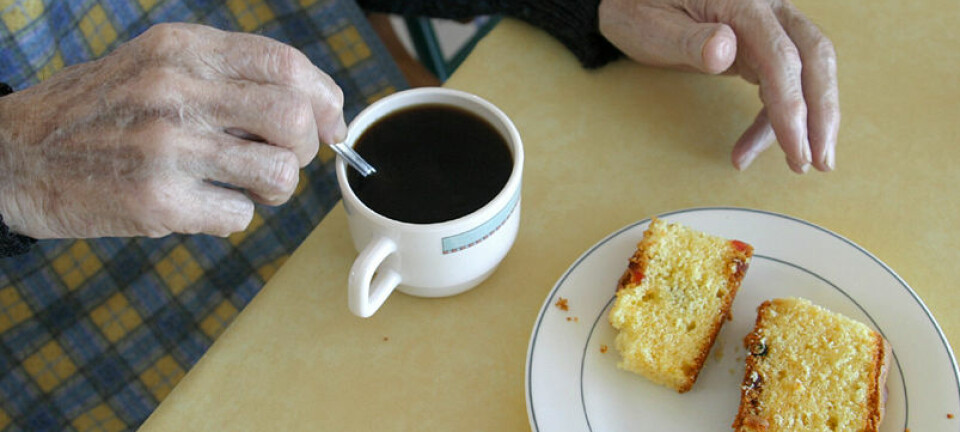
Low birth weight babies cope better with fasting later in life
New study suggests that low-weight babies apparently have an evolutionary advantage during periods of hunger and food shortage.
People who were born underweight can actually benefit from reducing their food intake for short periods throughout the rest of their lives, according to new a Danish study recently published in the journal Diabetologica.
"Our research shows that fasting may be a good idea. People who were born underweight seem to benefit particularly in terms of health by reducing their energy intake for a period of time," says Professor Allan Vaag, a consultant at the Department of Clinical Medicine at Copenhagen University Hospital, Rigshospitalet.
More energy during fasting
Vaag and his colleagues studied how the metabolism of 39 adult men was affected by fasting for 36 hours. A good half of the test subjects were underweight, i.e. weighed less than 2500 gram at birth. The remainder were of normal weight as infants.
While the men were fasting the researchers measured their blood sugar, insulin sensitivity, and the fat content of their blood.
Analyses revealed a high difference between how men with a low birth weight and men born at normal weight reacted to fasting:
By the end of the period of fasting the insulin and fat content of all the test subjects’ blood had fallen, although most in the men who were born underweight. So it would appear that people with a low birth weight enjoyed health promoting benefits as a result of fasting.
At the end of their fast, the energy consumption of the men who were underweight at birth was lower than that of those who came into the world at normal weight.
Malnourished people better suited to hunger
During the period of fasting, the men who were underweight at birth conserved more energy than the control group. The result suggests that people can better tolerate periods without food if they were underweight as infants.
"It may have something to do with some form of biological adaptation taking place during the embryonic stage, enabling people who for some reason did not get enough nourishment as embryos to tolerate hunger for the rest of their lives and actually benefiting health-wise from fasting,” says Vaag,
It would appear that during periods of hunger it can be an advantage to have been born undernourished:
Individuals who became accustomed to not getting enough nourishment at the embryonic stage may end up having a lower metabolism the rest of their lives, adapted to lower food intake. This put them in a better position than others in periods of hunger and fasting.
Small newborn babies become thrifty phenotypes
The new results are consistent with the theory formulated by two British researchers, Nick Hales and David Barker, who published 'The Thrifty Phenotype Hypothesis' in 1992.
According to their hypothesis:
-
Human physiology is plastic in early life when the growth and development of the embryo is shaped by the environment in the placenta.
-
The growth of an embryo is determined by genes but regulated by the nourishment coming from the mother.
-
If the mother gets too little nourishment, the embryo becomes a person particularly well suited to surviving periods without much food -- it becomes a thrifty phenotype.
- On the other hand, thrifty phenotypes do not tolerate eating too much very well and therefore face a higher risk of getting type II diabetes than others.
Thrifty phenotypes cannot tolerate gluttony
Population studies have shown that low birth weight can actually increase the risk of becoming obese, developing type II diabetes, cardiovascular disease and other illnesses, but Vaag and his colleagues from Copenhagen University Hospital are among the first to carry out experiments to ascertain whether the Thrifty Phenotype Hypothesis holds.
The researchers from Rigshospitalet have previously discovered that adult men who weighed too little at birth could not tolerate overeating.
They have also shown that people born underweight face a risk of heightened hungriness for the rest of their lives because they do not produce enough of the satiation hormone Leptin.
The new study fits perfectly in with the previous results, says Vaag.
"We’ve previously shown that overeating is particularly harmful if you’re underweight at birth. In this study we turned it around and asked: can it be beneficial for people with a low birth weight to reduce their energy intake?" says Vaag,
"Our new results confirm what we previously discovered, namely that the environment you’re exposed to in the embryonic stage should be compatible with the environment you’ll experience for the rest of your life. Overeating will be particularly harmful if you’re undernourished at the embryonic stage. On the other hand, though, you’ll benefit from reducing your energy intake. This confirms that the biological adaptation that takes place in the embryonic state lasts for the rest of your life," he says.
Many thrifty phenotypes in high-growth countries
The thrifty phenotype hypothesis may explain the extreme increase in the occurrence of type II diabetes in high-growth countries such as India and Brazil, says Vaag.
People in such countries are often poor and it’s likely they did not get much nourishment when they were in their mother's womb. That means they’d have a metabolism adapted to hungriness.
When the wealth of a high-growth country increases, and with it the range of food available, the population ends up eating more food than their metabolism is created for.
This is why many of them become overweight and contract lifestyle diseases.
Obesity researcher: short periods of fasting are good
The scientists didn’t look at what happens when test participants started eating normally again, so the study does not provide answers to whether or not it is generally a good idea to fast.
Professor Bjørn Richelsen, who studies obesity and metabolism at the Department of Clinical Medicine of Aarhus University, says it can -- for some people.
"For people with full energy depots it can be a good idea from a health point of view to fast for anything from several hours to a couple of days. Older people, pregnant women, children, and underweight individuals shouldn’t fast," says Richelsen.
Fasting makes for flexible metabolism
When you don't eat for a couple of hours or fast for a day or two, the body eats into its energy depots. This means that you burn calories from both fat and carbohydrates.
"Research shows that when you fast from time to time, the body gets better at switching rapidly between burning carbohydrates and fat, and this is a good sign that you’re able to switch between the two types of metabolism. The more metabolically flexible you are, the healthier you are. If, on the other hand, you have an inflexible metabolism, you face a higher risk of developing type II diabetes and cardiovascular disease," says Richelsen.
If you weigh too much or generally eat more food than is good for you, it can be a good idea to fast for a short period because fasting. When repeated, for example in a 5:2 diet, it helps make your metabolism more flexible.
And having a flexible metabolism is in itself health-promoting.
No evidence of weight loss
But what happens when you start eating again normally? Don't you simply put on extra weight?
"We have no documentation that you’ll on more than you weighed to begin with when you start eating again after having fasted for a couple of days. Although you do get a healthier metabolism, there’s still no evidence that you’ll lose weight in the long term because of regular fasting," says Richelsen
"And you should refrain from fasting for too long as the body then starts eating away at proteins from muscles and other tissue," he says.
-------------
Read the original story in Danish on Videnskab.dk
Translated by: Hugh Matthews
Scientific links
- "Metabolic response to 36 hours of fasting in young men born small vs appropriate for gestational age", Diabetologia (2014)
- "Type 2 (non-insulin-dependent) diabetes mellitus: the thrifty phenotype hypothesis", Diebetologia (1992)












